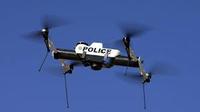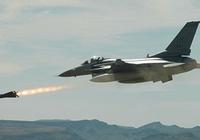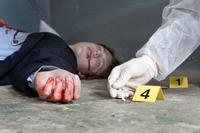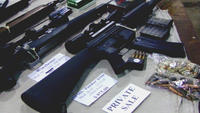-
More states consider laws to limit the use of drones by police

The Federal Aviation Administration (FAA) appears ready to allow the use of drones in the United States, by both law enforcement agencies and private citizens, almost with no restrictions. Experts predict that by the end of the decade, there will be about 30,000 drones flying over the United States. Legislators in at least eleven states want to impose limits on the use of UAVs as worries grow that the unregulated use of drones would erode the liberties of Americans.
-
-
December, January the top two months in terms of gun purchases in U.S.
New figures released by the FBI show that Americans, during December and January, have been buying guns in record numbers. Analysts say that behind the surge in gun purchases are two events: the Newtown, Connecticut mass shooting and the moves by the Obama administration to introduce – and, in the case of assault weapons, reintroduce – gun control measures. The FBI figures show that in January, the agency performed 2,495,440 gun background checks, initiated by gun sellers before they sold a gun to a customer.
-
-
Number of Muslim-Americans involved in domestic terrorism “vanishingly small”
The number of Muslim-Americans planning or perpetrating terror plots has always been exceedingly small – and it is declining. Fourteen Muslim-Americans were indicted for violent terrorist plots in 2012, down from twenty-one the year before. For the second year in a row, there were no fatalities or injuries from Muslim-American terrorism. For comparison: the United States suffered approximately 14,000 murders in 2012. Since 9/11, Muslim-American terrorism has claimed thirty-three lives in the United States. During the same period, there were more than 180,000 murders committed in the United States.
-
-
Some Democrats face a tough choice on gun control measures

As the gun control debate continues, and different proposed bills are being considered on the Hill, Democrats in red states are facing a tough decision, as their support for gun control measures may become a drag on their re-election prospects in the 2014 congressional elections.
-
-
Illinois expected to change law to allow carrying concealed guns
Illinois is the last state in the union that has a complete ban on carrying concealed weapons. Judge Richard Posner of the 7th Circuit Court of Appeals ruled that the current ban on concealed carry is unconstitutional and said some authorization of citizen concealed carry is long overdue.
-
-
Israel, again, beats Syria’s air defense systems

The Tuesday night Israeli air attacks against targets in Syria raise questions about the effectiveness of the vaunted Syrian air defense system. By extension, similar questions should be asked about the effectiveness of the Iranian air-defense system: both systems use similar technology, and both come from Russia.
-
-
Contours of Hill gun debate emerge
Two issues have emerged as central to the debate over post-Sandy Hook gun control legislation: the first is banning the sale of assault weapons and limiting the size of magazines, the second is requiring a universal background check to make sure those who buy guns are responsible and stable enough to handle them. Hill observers say that a bill requiring universal background check, if carefully drafted to address the concerns of those who live in rural areas, may pass, as would legislation to limit the size of magazines. Banning the sale of assault weapons may be more difficult.
-
-
Tight money hampers Detroit police
A non-profit data sharing consortium approached the Detroit Police Department last summer to see whether the department would like to join the consortium’s regional system and share technology that would allow the department effectively to put hundreds of officer back on to the streets. Joining the Courts and Law Enforcement Management Information System (CLEMIS) would have cost the city $1.2 million a year, which the city says it cannot afford.
-
-
Georgia police gets military-grade weapons
Metro Atlanta police departments and sheriff’s offices have recently acquired some new toys which include armored trucks, grenade launchers, and personnel carriers. According to the Georgia Department of Public Safety, $200 million in military equipment and weapons are owned by 600 Georgia law enforcement agencies. This military grade equipment has some people concerned as to why local law enforcement agencies are so heavily armed.
-
-
Israel’s attacks in Syria indicate Assad’s deteriorating position
Wednesday’s attacks are likely to be the first in a series of attacks which Israel will feel compelled to launch at an ever quickening pace as the Assad regime continues to disintegrate. Israel attacked targets inside Syria before, but not too often, and only when the targets were of strategic value. The deteriorating situation in Syria appears to have persuaded Israel that it has no choice but to renew its military operations inside Syria.
-
-
Pentagon to bolster U.S cyberwar capabilities
The Department of Defense is planning an expansion of the U.S. Cyber Command, and the Pentagon plans on recruiting thousands of code crackers, online security professionals, and hackers in order to assemble the nation’s largest cyber army ever.
-
-
Google wants to limit law enforcement’s access to e-mails, users’ information
In 2012 Google received 16,407 requests for user data, which affected 31,072 users or accounts. More than half of the requests were accompanied with a subpoena, the others were not. Google is planning on lobbying Washington this year to persuade lawmakers that they should make it harder for law enforcement to gain access to e-mails and other digital messages.
-
-
New Hampshire bill would limit searches, expand expectation of privacy

New Hampshire State Representative Neal Kurk ® says state residents do not expect,when they throw something out in their trash or leave a drinking glass with their saliva on it at a public place, that law enforcement, insurance companies, or data miners would use the trash left behind to glean personally identifiable information.
-
-
Majority of Americans -- gun owners and non-gun-owners -- support stronger gun laws

Gun violence claims 31,000 U.S. lives each year in the United States, and the rate of firearms homicides in America is twenty times higher than it is in other economically advanced nations. A new national public opinion survey conducted by researchers at the Johns Hopkins Bloomberg School of Public Health found that the majority of Americans support a broad array of policies to reduce gun violence. For many policies, there was little difference in support between gun owners and non-gun-owners.
-
-
Twitter’s information policy frustrates police, delights customers
Twitter’s robust approach to customers’ privacy has caused consternation among law enforcement agencies, who say that Twitter’s refusal to hand over information on users of the service, except in rare cases, has frustrated criminal investigations. Twitter’s user, though, appreciate the company’s scruples.
-
More headlines
The long view
Why Was Pacific Northwest Home to So Many Serial Killers?
Ted Bundy, Gary Ridgway, George Russell, Israel Keyes, and Robert Lee Yates were serial killers who grew up in the Pacific Northwest in the shadow of smelters which spewed plumes of lead, arsenic, and cadmium into the air. As a young man, Charles Manson spent ten years at a nearby prison, where lead has seeped into the soil. The idea of a correlation between early exposure to lead and higher crime rates is not new. Fraser doesn’t explicitly support the lead-crime hypothesis, but in a nimble, haunting narrative, she argues that the connections between an unfettered pollution and violent crime warrant scrutiny.
Bookshelf: Smartphones Shape War in Hyperconnected World
The smartphone is helping to shape the conduct and representation of contemporary war. A new book argues that as an operative device, the smartphone is now “being used as a central weapon of war.”
